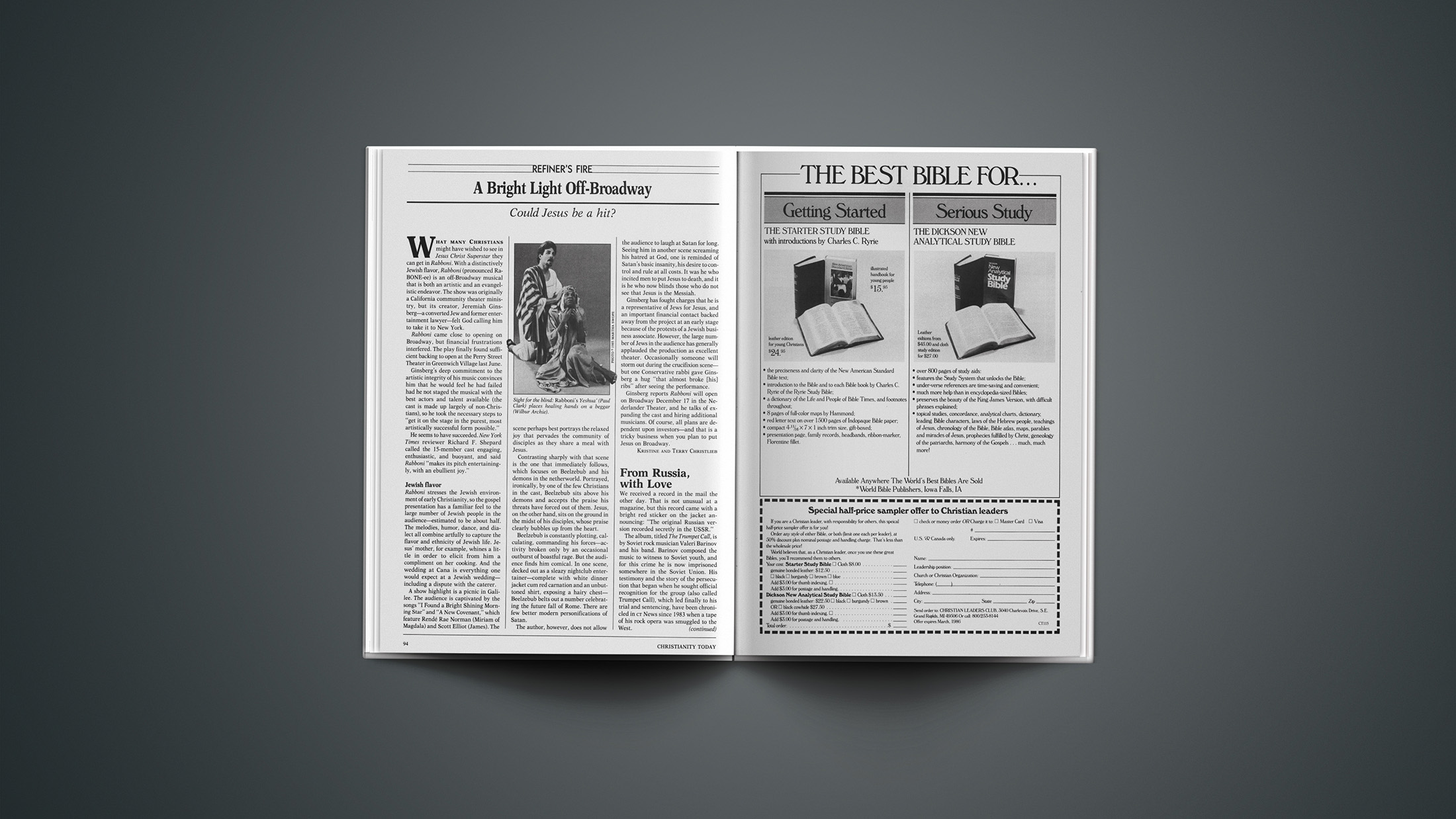In the public spat between Donald Trump and Benjamin Netanyahu, who would American evangelicals support? A new survey suggests it might be the Israeli.
Polled shortly after the Gaza war last May, it also reveals a substantial generational gap in level of support for Israel and a lack of impact by pastors from their pulpits.
And it happens to release this week, following Trump’s explosive comments.
In excerpts from a recently released interview, the former president blasted the former prime minister for his statement of congratulations to Joe Biden after the 2020 election.
“Nobody did more for Bibi. And I liked Bibi. I still like Bibi,” stated Trump in an expletive-laced diatribe, using Netanyahu’s nickname. “But I also like loyalty … Bibi could have stayed quiet. He has made a terrible mistake.”
Netanyahu responded with praise for Trump. But in noting a friendship with Joe Biden, he also honored the longstanding partnership between the US and Israel.
During his presidency, Trump moved the American embassy to Jerusalem, acknowledged Israeli sovereignty over the Golan Heights, and negotiated with five Muslim-majority nations to normalize relations with the Jewish state.
American evangelicals joined Netanyahu in appreciation. According to a new online poll surveying a multiethnic panel of approximately 1,000 self-identified evangelical and born-again Christians, 35 percent say they became more supportive of Israel because of Trump’s policies. Only 11 percent became more supportive of Palestinians, while 53 percent had no change.
And overall, 68 percent of American evangelicals believe the Jewish people today have the right to the land of Israel, by virtue of the covenant God made with Abraham which “remains intact today.” (About 23% say they don’t know.)
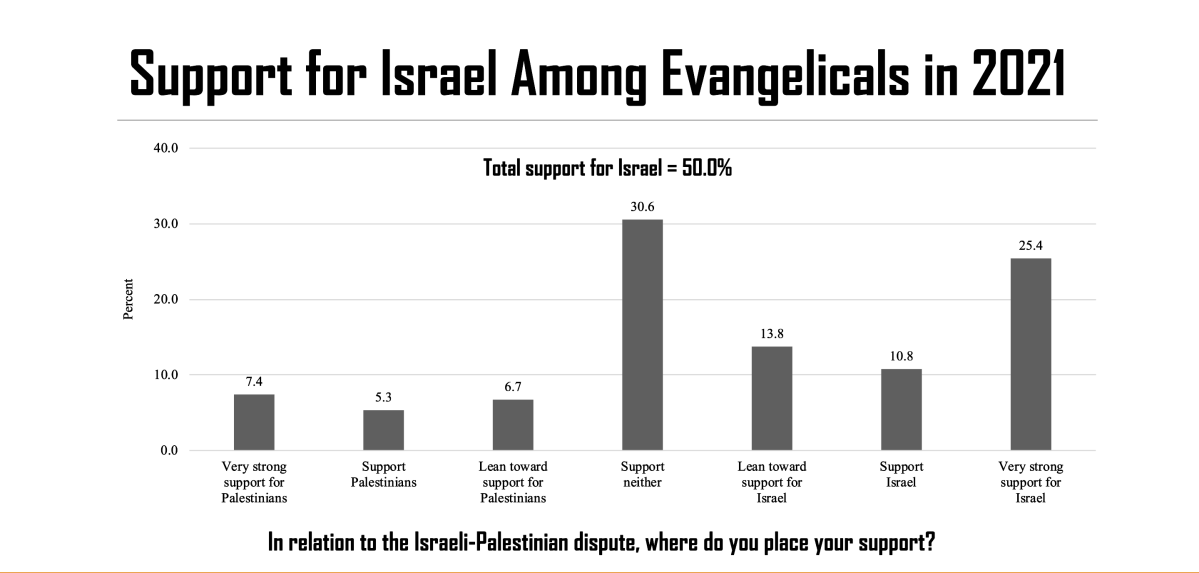
The survey, conducted by professors Kirill Bumin and Motti Inbari from the University of North Carolina–Pembroke in conjunction with Barna Group, was released today but conducted in July, well before public knowledge of Trump’s falling out with Netanyahu.
The 15-year Israeli prime minister scored a 74 percent favorable rating, based on the share of evangelicals who gave him a score of 6 or greater on a 10-point scale. One in five (22%) gave him the top rating possible.
The survey did not include a direct comparison. But given the fact that it included evangelicals of all ethnicities (59% white, 24% Black, 11% Hispanic), researchers found that support for Biden and for Trump by vote share was almost identical (42% vs. 40%)—even though 49 percent of evangelicals believed a Biden presidency would hurt the US relationship with Israel. Conversely, 31 percent believed Biden would do no harm.
Similarly, 47 percent believed Netanyahu’s defeat as prime minister, to a coalition headed by Naftali Bennett, would hurt the Israeli relationship with US evangelicals. Only 16 percent believed it would do no harm.
Nearly 1 in 2 (47%) believed Netanyahu improved these relations, compared to only 16 percent who did not.
In terms of relations with Palestinians, American evangelicals largely recognized Israeli policy as “fair.” Asked about how Israel treats Palestinians in the Palestinian territories, 53 percent of respondents scored Israel’s treatment at 6 or greater on a 10-point scale. While only 14 percent said it was “completely fair,” only 19 percent scored Israel at 4 or lower.
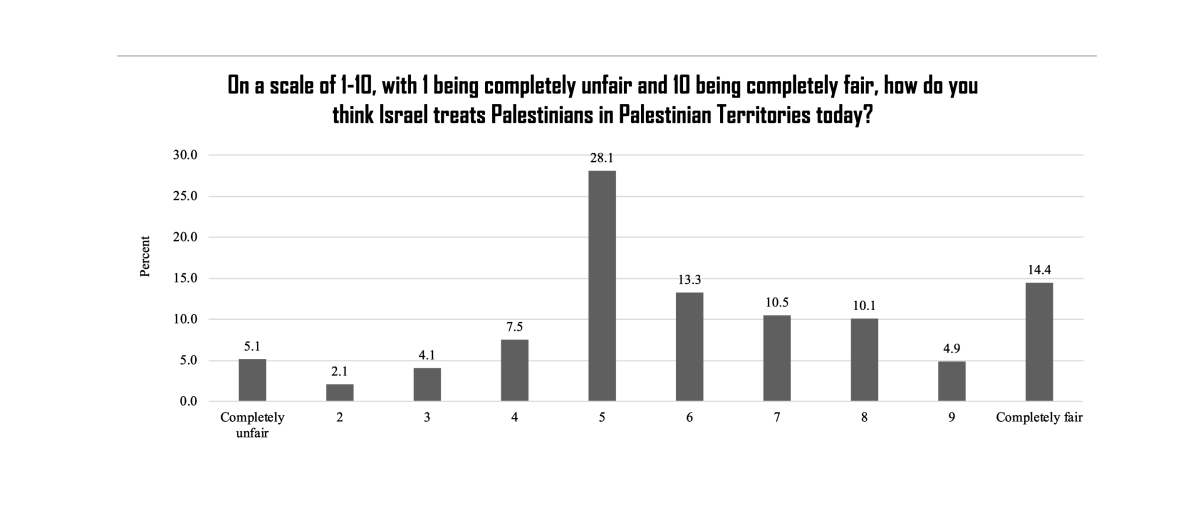
The 11-day conflict in May between Israel and Hamas in the Gaza Strip did not significantly alter evangelical perceptions.
Protesting threatened evictions of Palestinians from their homes in East Jerusalem over complex leases, Hamas launched missiles toward Israeli cities. Israel responded, stating its missiles were aimed at militant targets often located in civilian centers. According to the UN, 256 people, including 66 children and 40 women, were killed in Gaza, while 13 people were killed, including two children and six women, in Israel.
While 48 percent of American evangelicals reported no change in their overall opinion, 26 percent stated the conflict increased their support for Israel. Only 7 percent stated it increased their support for Palestinians.
A plurality (43%) blamed both sides equally. One in three (34%) blamed Palestinians primarily, while 17 percent blamed Israel primarily.
Overall, the report, sponsored by the Messianic Jewish organization Chosen People Ministries, notes that “only” 50 percent of American evangelicals support Israel (25% “very strongly”) in its dispute with Palestinians, whom 19 percent support. The remaining 31 percent support neither side.
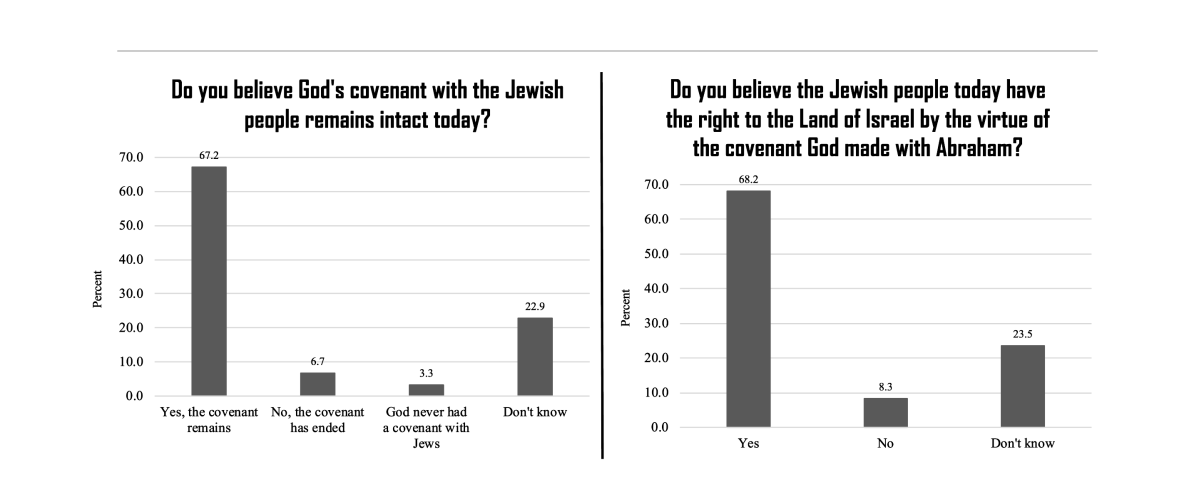
A similar survey released earlier this month by Grey Matter Research identified 20 percent of American evangelical Protestants as “Israel loyalists,” who see the Jews as “God’s chosen people” today and put a high priority on supporting them via charity. (It did not poll specifically about Palestinians.)
Using the National Association of Evangelicals’ four-point definition of evangelicals by belief but not restricting its sample to white evangelicals as many surveys do, the Grey Matter study found a roughly even split between evangelicals who believe charitable support for Israel is a high vs. low priority, as well as an even split between evangelicals who believe the Jews are God’s chosen people today vs. who do not believe this.
These statistics align well with the UNC-Pembroke survey, which found that 52 percent of American evangelicals say their religious beliefs make them more supportive of Israel. Only 8 percent say it makes them more supportive of Palestinians, and 40 percent say it doesn’t impact their view of either side.
Notably, only a third of American evangelicals claim their knowledge of the conflict is “moderate” (23%) or “extensive” (13%). Half claim “limited” (26%) or “very limited” (26%) knowledge, and 13% claim “no knowledge at all.”
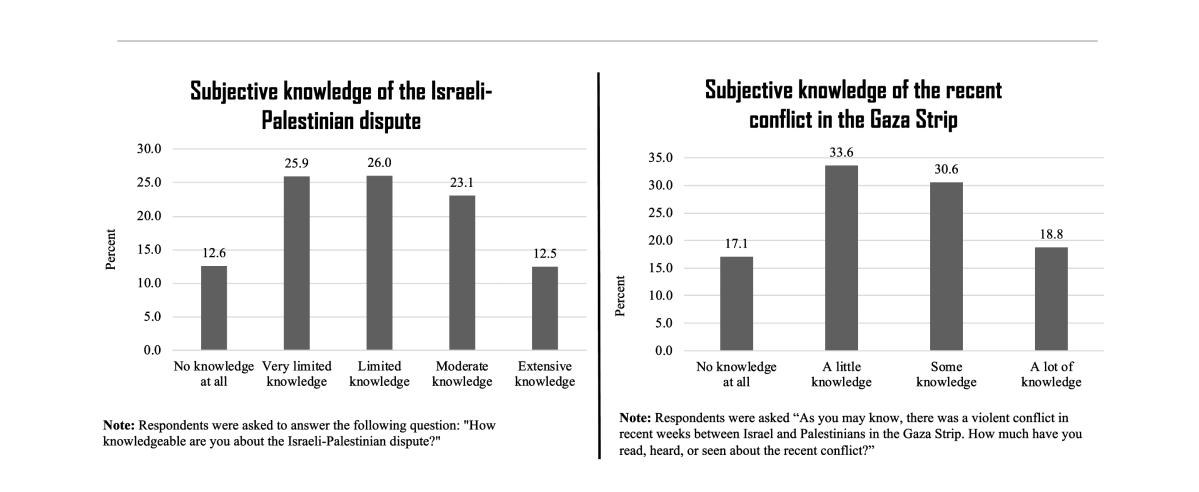
In terms of policy, 41 percent want the US to support Israel, while 10 percent want the US to support Palestinians. About 1 in 3 (36%) want the US to remain neutral.
Despite widespread criticism that Trump’s policies in office favored Israel, he consistently maintained that his efforts were a new strategy to resurrect a failing peace process.
The survey did not query evangelicals on who they blame primarily for the lack of peace. But like many, Trump initially put the onus on Palestinians.
He appears to have changed his mind.
“Bibi did not want to make peace. Never did,” Trump stated for a Hebrew book project on the normalization deals, released last weekend. “I [had] thought the Palestinians were impossible, and the Israelis would do anything to make peace and a deal. I found that not to be true.”
The reporting claims Netanyahu surprised the White House by announcing a controversial West Bank annexation during the rollout of Trump’s peace plan. Israel’s then-ambassador to the US denies the claim.
Is Trump’s shift similar to that of younger US evangelicals, which previous surveys have found are growing less attached to the nation of Israel? Those 65 years and older are four times more likely to express high levels of support for Israel than those under 30 years of age.
Overall, 29 percent of younger evangelicals support Israel while 45 percent support the Palestinians. And while 40 percent blamed Israel and Palestinians equally for the Gaza conflict, those faulting one side or the other balanced out. Three in 10 blamed Israel (29%) or Palestinians (27%) primarily.
Of US policy, 36 percent of evangelicals under 30 want America to remain neutral. Israel ranks slightly higher for US support at 31 percent, while 26 percent want the US to support Palestinians.
The younger generation is consistent with evangelicals at large in viewing Israel’s treatment of Palestinians in their territories as fair: 53 percent gave a score of 6 or above on a 10-point scale. But more chose an “unfair” rating than evangelicals at large: 25 percent gave a score of 4 or below.
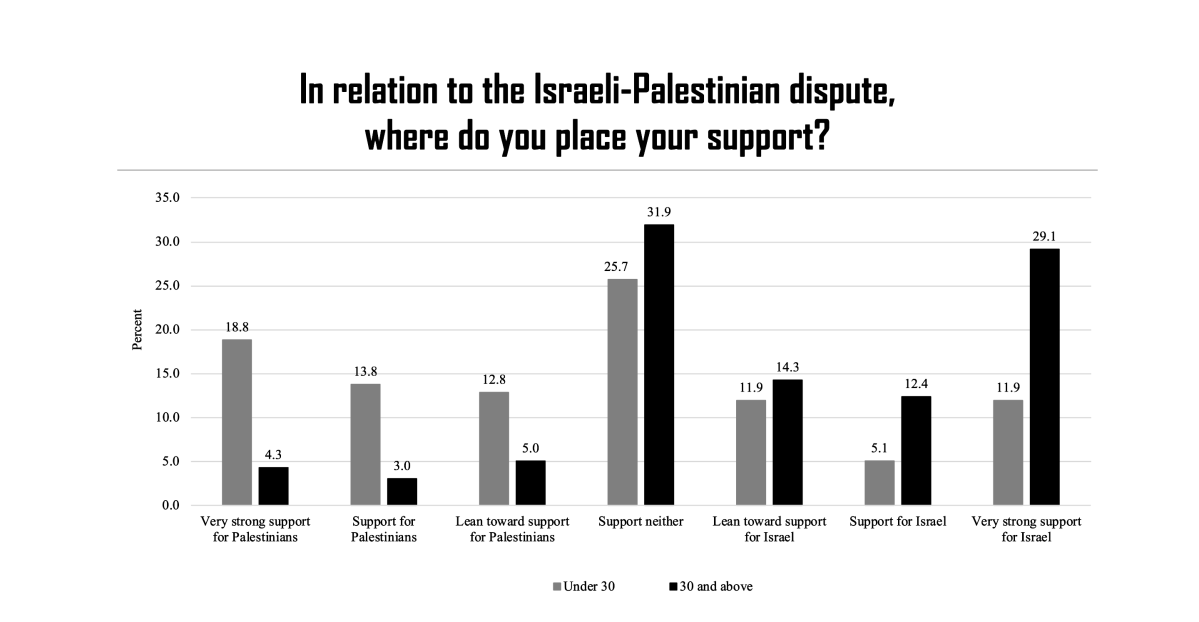
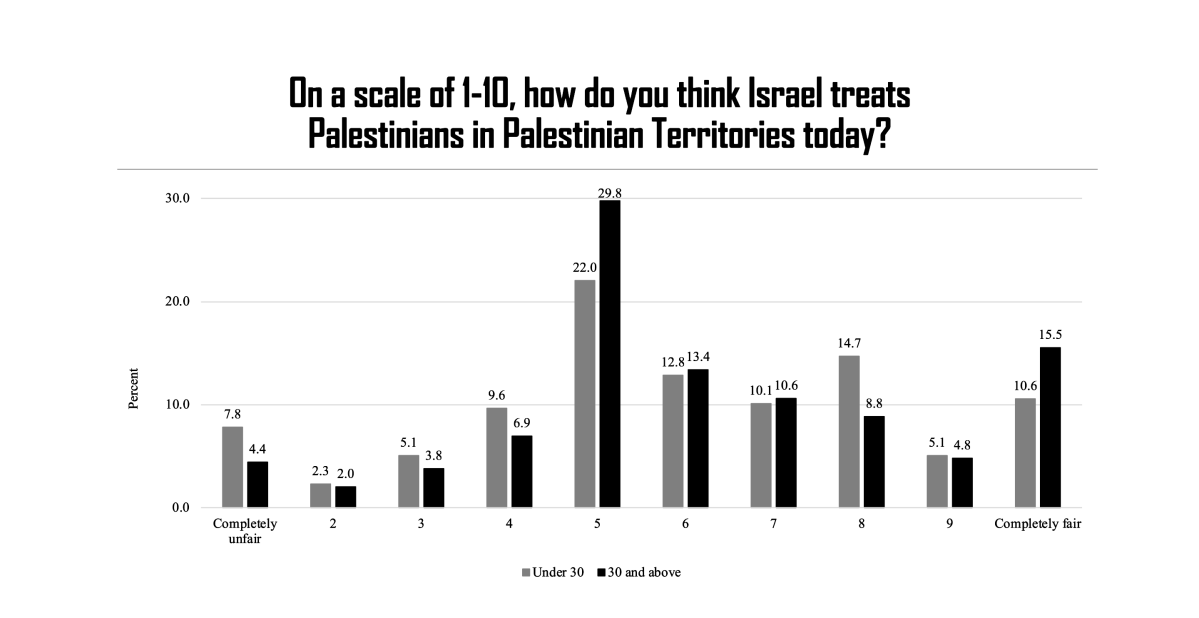
While age has the largest statistically significant impact, it is not the only corresponding factor.
Evangelicals who never attend church are 63 percent less likely to support Israel than those who attend at least once per week. Adherents of postmillennial and amillennial eschatologies (who comprise 22% and 33% of evangelicals, respectively) are 51 percent less likely to support Israel than premillennialists (who comprise 33%). And those with positive views of Muslims (34%) are 27 percent less likely to support Israel than those with negative views (19%). (A plurality of 34 percent of evangelicals are neutral.)
There is no relation between the frequency of pastoral statements of support for Israel to overall evangelical opinion. Neither is race or ethnicity or commitment to social justice a statistically significant factor.
However, researchers noted that African American evangelicals express the lowest levels of support for Israel (37%) and the highest levels of support for the Palestinians (31%). Among Hispanic evangelicals, 40 percent support Israel and 23 percent support the Palestinians. Among white, non-Hispanic evangelicals, 58 percent support Israel and 14 percent support the Palestinians.
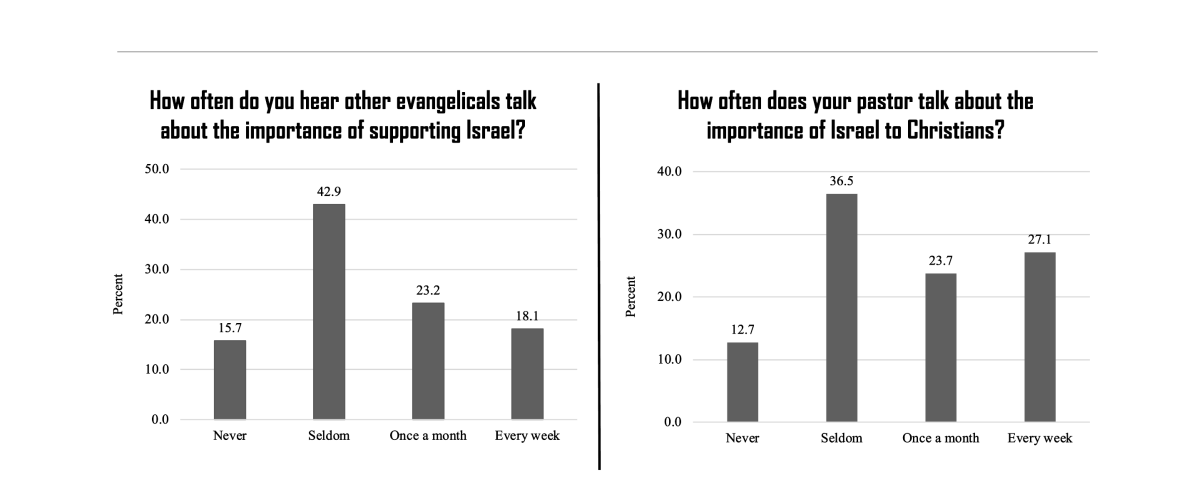
And while a quarter of American evangelicals say their pastor talks about “the importance of Israel to Christians” every week (27%) or once a month (24%), a plurality say “seldom” (37%), and 1 in 10 say “never” (13%).
Similarly, a plurality of American evangelicals say they “seldom” hear other evangelicals talk about “the importance of supporting Israel” (43%), compared to those hearing it every week (18%) or once a month (23%) vs. never (16%).
CT invited evangelical experts in the US and in Israel to react to the survey results:
Robert Nicholson, president of Philos Project:
Most young evangelicals still believe in biblical promises regarding the people and land of Israel, but have a hard time thinking about the State of Israel and why it’s necessary to defend that people on that land. They don’t realize that a Jewish-majority country makes the Near East more pluralistic, not less. Worst of all, they’ve bought into the silly idea that support for a Jewish state means opposition to Palestinians, Arabs, or Muslims—which of course isn’t true.
Young evangelicals, as opinionated as they are, don’t know much about Israelis or Palestinians. Their views are based on gut feelings, media impressions, slogans, and peer pressure. Few have spent any time in the region, and even fewer know anything about the Jewish people beyond Sunday school stories they grew up on.
It is wholesale ignorance of the Jews, and for that matter Palestinians, that produced these survey results. The answer is immersive education and personal encounter.
Gary Burge, professor of New Testament at Calvin Theological Seminary, author of Whose Land? Whose Promise? What Christians Are Not Being Told About Israel and the Palestinians:
Younger generations see social justice as central to their faith. Despite Israel’s consistent effort to shape the Palestinian narrative, when this survey is compared with parallel surveys just 20 years ago, evangelicals are increasingly neutral in their political views on Israel and Palestine, as younger generations realize that four million people held in military occupation by Israel is a moral issue.
But surveys such as this generally have two problems. First, “self-identified” evangelicals may today only represent those who have wed their faith to Republican politics, as many other younger evangelicals have left and are not represented here. Second, the survey leads with biblical language about God’s “covenant people,” which skews the following questions about justice. When a survey is commissioned by a pro-Israel organization (Chosen People Ministries), we are wise to question its results.
Danny Kopp, co-pastor of the Narkis Street Congregation in Jerusalem:
The very framing of this issue in this survey as binary is a tragic reflection of our inability as Christians to appreciate moral complexity in our lives and in the lives of nations. The Bible weaves a complex narrative of God’s unique calling of a particular people, the Jews, to demonstrate his universal love and impartial care for all peoples.
It is a merciful truism that throughout the biblical narrative every hero is flawed and no villain is beyond redemption. Yet, we as Christians, who should be the most adept at introspection and self-criticism, throw this principle out the window and are increasingly recognized as the most tribal in our unswervingly blind loyalties to political dogmas and personalities.
The Israelis have a right to live in their own national homeland at peace with their neighbors, while the Palestinians deserve support in their pursuit of a political accommodation that affords them equal rights in their national homeland. Maintaining a nuanced, sophisticated biblical perspective in no way means that we should ascribe moral equivalence to either side’s political blunders, but it means that we can never lose sight of God’s unique, particular, and equal calling upon both Israelis and Palestinians.
Munther Isaac, academic dean at Bethlehem Bible College and pastor of the Evangelical Lutheran Christmas Church, Bethlehem:
What is troubling is that many evangelicals have very strong opinions about Palestine and Israel, while having limited knowledge about the reality on the ground. What is missing is a theology of justice and peacemaking, which should not depend on one’s view on eschatology, but on our call to bring God’s love to all peoples, as ambassadors of reconciliation.
Evangelicals, like all Christians, must take informed positions. Peacemaking involves listening to both sides of a conflict, taking risks, and standing on the side of justice. We must speak truth to power, even when it involves our own people, religion, or nation.
Trump and Netanyahu were not good for peace. Their approach was based on the logic of might and power, not truth and justice. America and Israel are political allies, basing their actions on what is best for their own political interests. Their policies did not reflect the biblical verse: “Act justly, love mercy, and walk humbly with your God.”
Michael Brown, Messianic Jewish radio host of The Line of Fire:
Given the way these evangelicals voted, I’m pleasantly surprised that the support for Israel is as high as it is. That being said, the poll confirms a growing and disturbing trend.
Why is this the case? First, the younger generation does not have a memory of the horrors of the Holocaust and the miraculous birth of the State of Israel. To them, Israel is the bully, intimidating and hurting the Palestinian population. And, since they have a heart for justice and for the underdog, they naturally side more with the Palestinians.
If they had a more accurate and fuller picture, they would realize that having a heart for justice means recognizing the agonizing history of the Jewish people, the degree to which Israel is surrounded by hostile, even deadly enemies, and Israel’s deep desire to live at peace with its Arab neighbors.
Second, as we know through church history, forms of replacement theology, also known as supersessionism, open the door to antisemitism.
The key for Christians of all ages is education: Let them be well grounded in the Scriptures, let them know church history, and let them get the full picture of the conflict. If they do, they will recognize God’s restoration of the Jewish people to the land; they will pursue justice for all; and they will love their Muslim neighbor just as they love their Jewish neighbor. And when Israel does wrong, as friends and supporters of Israel they will speak the truth in love.
Lisa Loden, co-chair of the Lausanne Initiative for Reconciliation in Israel-Palestine:
Depending on current events and diverse theologies, evangelical support of Israel is continually in flux. Surveys are always a snapshot, never a cross-section, and this survey is no exception.
Evangelicals need to fully integrate the social aspect of the gospel with their theology, and especially their eschatology. Evangelical ignorance, polarization, and lack of active interest in the real-time effect of the Israeli-Palestinian conflict on the local populations are lamentable.
White US evangelicals will likely continue to support Trump and Netanyahu, whose views are both solidly pro-Israel, regardless of the current discourse and their reduced national roles.
Salim Munayer, executive director of Musalaha and regional director for the World Evangelical Alliance’s Peace and Reconciliation Network:
From this survey—especially concerning the recent conflict in Gaza—we can see a trend that there is a growing gap between young and older evangelicals. One possible explanation is the multiple sources of information young people are exposed to on social media.
It is also amazing to see that despite their very strong feelings, American evangelicals claim to have limited knowledge of the conflict. Especially when only 10 percent have traveled to the region to know the reality on the ground.
It seems that their opinions are highly shaped by theology, their view on Islam, and participation in church life.
Gerald McDermott, author of Israel Matters, editor of The New Christian Zionism and Understanding Jewish Roots of Christianity:
The survey suggests what many of us have been noticing for several decades—that evangelicals are less biblically literate and less informed about what is going on in Israel today. More and more evangelicals are unaware, for example, of Paul’s belief in God’s ongoing covenant with the Jewish people (Rom. 11:28–29), his belief in the land promise (Acts 13:19), and Jesus’ promise that one day Jerusalem will welcome him (Matt. 23:39; Luke 13:35). Nor do they know that more than two million Israeli citizens are Palestinians who enjoy world-class education and health services and do not want to live under Palestinian rule in the West Bank or Gaza.
The survey also shows that support for Israel is down among those under 30, but there are surprises. While 45 percent offer strong support for Palestinians, only 29 percent say Israel is to blame for the recent Gaza fighting, and only 26 percent say the US should take the Palestinians’ side in the conflict. Further, a majority of those under 30 say Israel is “fair” to Palestinians who live in Palestinian territories.
The recent exchange between Trump and Netanyahu shows Trump as petty and Netanyahu as statesman-like. I think most evangelicals would agree.
James Zogby, president of the Arab American Institute:
This survey tracks polling we have done which shows that there is a significant shift in the attitudes of younger voters, including those who self-identify as “born again,” toward Israel/Palestine. We believe it is the result of access to expanded sources of information.
This generation is more tolerant, more accepting, and more inclusive, and I suggest that their thinking is more in tune with the vision of Jesus. They see situations like the Israeli-Palestinian conflict as less black and white, and have more compassion for those they identify as victims of the hostilities. So this shift in attitudes among the young born-again Christians doesn’t surprise me at all.
That said, I am puzzled that race was not a significant factor in determining support for Israel. In our polls, the two main factors in shaping attitudes on Israel are age and race.
Jaime Cowen, former president of the Union of Messianic Jewish Congregations:
I believe the evangelical church’s support for Israel is part of a correction in rebuilding relationships between the church and the Jewish people. While it cannot undo the tremendous harm of historic Christian antisemitism, it has gone a long way towards breaking down walls between Christians and Jews, and paved a way for the rise of Messianic Judaism. So while evangelical views of Israel’s contemporary government and politics are incredibly naïve and often one-sided, it still is better than past injustices.
Sadly, the politicization of the gospel in the US has turned off many young people, including those in evangelical churches. It is strange and unfortunate how support for Israel is lumped in with opposition to abortion, LGBT issues, and critical race theory. Support for Israel becomes problematic, especially as the younger generations confront social injustices, which include Israeli policy towards the Palestinians. Unless Israel seriously tries to address the Palestinian question, support for Israel will likely continue to erode.
The support for Trump among evangelicals is the most shocking thing I have ever witnessed as a believer. He was popular among the majority of Israelis, but damaged US-Israel relations by offering American support for anything Israel did. As for Netanyahu, he did nothing about a problem that eventually must be addressed. While his efforts to reach agreements with other Arab nations is highly laudable, it doesn’t negate the elephant in the room.
Todd Deatherage, executive director of The Telos Group:
The shifting attitudes of younger evangelicals toward Israelis and Palestinians in their conflict is significant, but not surprising. We’ve been seeing movement within pockets of evangelicalism for years, as more Christians try to re-center their faith away from politicization and back around Jesus and his teachings. When Jesus is at the center, nationalistic forms of Christianity like Christian Zionism just don’t hold up.
These changing attitudes represent an opening for Christians to support mutual flourishing for Israelis and Palestinians, all of whom deserve equal measures of freedom, dignity, and security as image-bearers of God.
And I think these numbers are also connected to something else we’re seeing: the growing number of Christians who are pursuing justice and reconciliation in a variety of ways, as they live out the charge Jesus gives his followers to be peacemakers.
Botrus Mansour, lawyer, writer, and evangelical leader in Nazareth:
I regret that a large portion of American evangelicals’ knowledge of the conflict, by their own admission, is limited. But it has great impact on American policies on the ground. They had a large role in promoting the anti-Palestinian sentiment that informed the Netanyahu-Trump era, which was bad for peace in the Holy Land.
The young evangelicals’ view of the conflict is fairer. Palestinians are people created in God’s image and are entitled to human dignity. I would expect that more American evangelicals pray for them, and act as brokers for peace.
Mitch Glaser, president of Chosen People Ministries and sponsor of the survey:
I am concerned about how evangelicals view Israel, as they are often Israel’s greatest supporters in the United States. Yet, often it seems as the reputation of Israel becomes tarnished, particularly among younger evangelicals, Israel is cast as the aggressor, rather than as the responder to aggression. Further education in Christian colleges, seminaries, and local churches needs to be developed. Videos, podcasts, and social media should be created to further inform these future leaders of the church.
Unfortunately, when we have a negative view of others, whether Palestinians or Jewish Israelis, often instead of love and mission there is enmity and a lack of passion for winning these Abrahamic cousins to Jesus.
I believe prophecy was fulfilled in the formation of the modern state of Israel in 1948, but Israel is not yet what Israel will become. One day my beloved Jewish people will turn to Yeshua the Messiah, as promised by the prophet Zechariah, and “they will look to Me whom they have pierced.”
Until then, I pray my fellow evangelicals will have a positive view of the Jewish people, and even come to the conclusion that by virtue of the Abrahamic Covenant, the land does belong to them.









